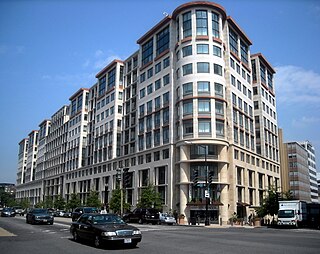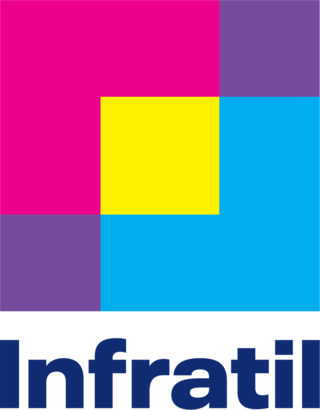Related Research Articles

The International Finance Corporation (IFC) is an international financial institution that offers investment, advisory, and asset-management services to encourage private-sector development in less developed countries. The IFC is a member of the World Bank Group and is headquartered in Washington, D.C. in the United States.
Global Affairs Canada is the department of the Government of Canada that manages Canada's diplomatic and consular relations, promotes Canadian international trade, and leads Canada's international development and humanitarian assistance. It is also responsible for maintaining Canadian government offices abroad with diplomatic and consular status on behalf of all government departments.
Power Corporation of Canada is a management and holding company that focuses on financial services in North America, Europe and Asia. Its core holdings are insurance, retirement, wealth management and investment management, including a portfolio of alternative investment platforms.

BCE Inc., an abbreviation of its former name Bell Canada Enterprises Inc., is a publicly traded Canadian holding company for Bell Canada, which includes telecommunications providers and various mass media assets under its subsidiary Bell Media Inc. Founded through a corporate reorganization in 1983, when Bell Canada, Northern Telecom, and other related companies all became subsidiaries of Bell Canada Enterprises Inc., it is one of Canada's largest corporations. The company is headquartered at 1 Carrefour Alexander-Graham-Bell in the Verdun borough of Montreal, Quebec, Canada.

Infratil Limited is a New Zealand–based infrastructure investment company. It owns renewable energy, digital infrastructure, airports, and healthcare assets with operations in New Zealand, Australia, Asia, the US and Europe. Infratil was founded by the late Lloyd Morrison, a Wellington-based merchant banker. Morrison's company, Morrison & Co is responsible for Infratil's management and administration.

Export Development Canada is Canada's export credit agency and a Crown corporation wholly owned by the Government of Canada. Its mandate is to support and develop trade between Canada and other countries, and help Canada's competitiveness in the international marketplace.
The 2006 sale of the Shinawatra family's share of Shin Corporation (ShinCorp) to Temasek Holdings caused great controversy in Thailand. The sale was in response to long-standing criticisms that the Shinawatra family's holdings created a conflict of interest for Thai Prime Minister Thaksin Shinawatra. Criticisms of the sale focused on the insistence by Thaksin and a compliant government that the transaction was exempt from capital gains tax, the fact that the Thai company was sold to a Singaporean company, and the fact that the Thai law regarding foreign investments in the telecom sector had been amended just prior to the sale. Thaksin's sale also impacted holdings, among other parties, of the Crown Property Bureau that had an investment in Siam Commercial Bank that held ShinCorp stock.
Crown corporations are government organizations in Canada with a mixture of commercial and public-policy objectives. They are directly and wholly owned by the Crown.
The Canada Pension Plan Investment Board, operating as CPP Investments, is a Canadian Crown corporation established by way of the 1997 Canada Pension Plan Investment Board Act to oversee and invest the funds contributed to and held by the Canada Pension Plan (CPP).
The Foreign Investment Review Agency (FIRA) was established by the Canadian Parliament in 1973 to ensure that the foreign acquisition and establishment of businesses in Canada was beneficial to the country. The Foreign Investment Review Act that created the agency was the culmination of a series of government reports and debates. The 1957 report of the Royal Commission on Canada's Economic Prospects (known as the Gordon Commission) firmly planted foreign investment on the political agenda. Next, the 1968 Watkins report (known formally as Foreign Ownership and the Structure of Canadian Industry), called for a national policy capable of handling Canada's interests in the age of the multinational corporation.
The Ontario Municipal Employees Retirement System (OMERS) is a Canadian public pension fund, headquartered in Toronto, Ontario. OMERS is a defined benefit, jointly sponsored, multi-employer public pension plan created in 1962 by Ontario provincial statute to administer retirement benefits and manage pension investment funds of local government employees in the Canadian province of Ontario. As of December 31, 2022, OMERS had C$124 billion of assets under management. OMERS serves over 1,000 participating employers and more than half a million active, deferred and retired employees. OMERS members are employed by municipalities, school boards, transit systems, local electrical distribution companies, police service boards, fire fighting and paramedic services, children's aid societies and associated local agencies, boards and commissions.

Actis LLP is a global investment firm focused on sustainable infrastructure, in particular the energy, infrastructure, and real estate asset classes.
British International Investment, is the development finance institution of the UK government. The Foreign, Commonwealth and Development Office is responsible for the organisation, and is the sole shareholder. It has an investment portfolio valued around US$7.1 billion and since 2011 is focused on the emerging markets of South Asia and Africa via its direct investment and cooperation with important global stakeholders such as Standard Chartered.

The Public Sector Pension Investment Board is a Canadian Crown corporation established by the Parliament of Canada in September 1999 through the Public Sector Pension Investment Board Act. PSP Investments is one of Canada's largest pension investment managers, with CAD $264.9 billion of net assets under management in fiscal year 2024.
The Uganda Development Corporation (UDC) is an agency of the government of Uganda. It promotes and facilitates the industrial and economic development of Uganda. Formed in 1952, it had some success in promoting local industrial development and was swelled with the addition of newly nationalised industries in the early 1970s. These, however, proved too much for the corporation, and it went into a slow decline before being completely phased out in 1998. The organisation was reconstituted with similar aims in 2008.

The Russian Direct Investment Fund is Russia's sovereign wealth fund established in 2011 by the Russian government to make investments in companies of high-growth sectors of the Russian economy. Its mandate is to co-invest alongside the world's largest institutional investors, direct investment funds, sovereign wealth funds and leading companies.
Edper Investments Ltd. was the primary holding company and investment vehicle for brothers Edward Bronfman and Peter Bronfman between 1959 and 1995. At its peak in the 1980s, and early 1990s, Edper was one of the largest corporate conglomerates in Canada, controlling more than 500 private and publicly traded companies in a complex structure that was estimated to be worth $100 billion, employed more than 100,000 Canadians, and comprised 15% of the total capitalization of the Toronto Stock Exchange.
The Canada Infrastructure Bank (French: Banque de l'infrastructure du Canada) (CIB) is a federal Crown Corporation of Canada tasked with financially supporting revenue-generating infrastructure projects that are "in the public interest" by catalyzing private investment through methods such as direct investment and public-private partnerships.
Investment Corporation of Dubai is the principal investment arm of the Government of Dubai focused on strengthening Dubai’s economy through long-term value and wealth creation and investing in global opportunities. Established in 2006, ICD manages the Government of Dubai Portfolio of commercial companies and investments. In 2022, ICD reported assets worth $320 billion and revenue of $73 billion. The Dubai-based corporation provides strategic oversight, develops and implements investment strategies and corporate governance policies, and operates in multiple sectors, including oil and gas, transportation, banking, and financial services.
References
- ↑ Hampson, Anthony H., The Canada Development Corporation Archived 2007-02-10 at the Wayback Machine , address to the Empire Club of Canada, February 17, 1972
- 1 2 3 4 Canada Development Corporation, The Canadian Encyclopedia
- ↑ Canada Development Corporation Archived 2007-02-13 at the Wayback Machine , Empire Club of Canada addresses, February 17, 1972
- ↑ David Johnson (2006). Thinking Government: Public Sector Management in Canada. University of Toronto Press. pp. 51, 172. ISBN 978-1-55111-779-9.
- ↑ United States International Trade Commission (1985). Foreign industrial targeting and its effects on U.S. industries, phase III: Brazil, Canada, the Republic of Korea, Mexico, and Taiwan : report to the Subcommittee on Trade, Committee on Ways and Means, U.S. House of Representatives, on investigation no. 332-162 under section 332(b) of the Tariff Act of 1930. U.S. International Trade Commission. p. 104.
- ↑ "A humble man of many talents, John Evans reinvented medical education". JUDY STOFFMAN. The Globe and Mail, March 25, 2017
- ↑ "COMPANY NEWS; Canada Unit to Get 58% Stake in Savin". New York Times, Jan 23, 1982
- ↑ Tasha Kheiriddin; Adam Daifallah (25 June 2008). Rescuing Canada's Right: Blueprint for a Conservative Revolution. John Wiley & Sons. p. 21. ISBN 978-0-470-15721-3.